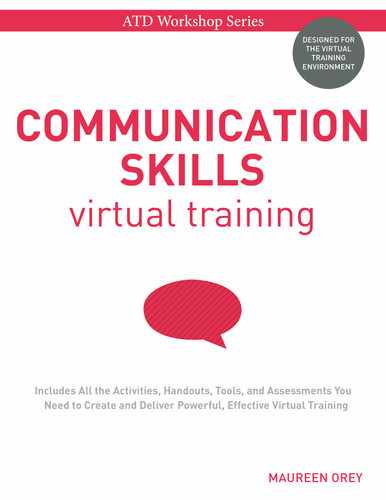Chapter 11
Assessments
What’s in This Chapter
• Ten assessments to use in your workshops in thumbnail format for reference
• To pre-work or not to pre-work, that is the question
• Refer to chapter 13 for instructions to download full-size assessments
Assessments and evaluations are critical to a workshop—before it begins, as it goes on, and when it concludes. To prepare an effective workshop for participants, you have to assess their needs and those of their organization. Although a formal needs analysis is outside the scope of this book, the needs analysis assessments in this chapter can help you identify important information about the expectations for the workshop—both of the organization and of the participants—and about what participants’ current knowledge or skill level of the topic may be. This information can help you make course adjustments to fit the needs of the learners and their organization.
Using assessments during the workshop helps participants identify areas of strength and weakness, enabling them to capitalize on their strengths and improve their weaknesses to be able to perform better in the workplace. Assessments can also be used during the workshop to check in on participants’ learning so that you can make any needed adjustments as you go.
Finally, evaluation assessments of the workshop and the facilitator are vital both for the organization and for you as the facilitator. To learn if you met the goals and expectations, you want direct responses from participants. Although negative comments can be tough to read, ultimately they allow you to continually learn and improve your skills as a learning facilitator.
The instruments in this chapter provide instructions on how to complete each assessment and when to use it in the course of the workshop, as well as an explanation of the assessment’s purpose. See chapter 13 for complete instructions on how to download the workshop assessment instruments.
To Pre-Work or Not to Pre-Work …
One of the most common uses of assessments is as pre-work before a workshop event. And yet there seems to be a never-ending discussion about whether or not pre-work is beneficial. On one hand, pre-work can build interest among participants, increase personal investment in the training, and connect participants with the facilitator and others in the workshop. On the other hand, the pressures of the workplace make it a certainty that at least some of your participants won’t complete it. Then what do you do?
Many of the assessments offered here are designed to be short enough to complete during the workshop, and you can incorporate them easily into the flow of your workshop agenda. There is one exception to this: Assessment 2: Communication Style Inventory (CSI), courtesy of Ken Phillips of Phillips Associates, which is longer and more robust than may be easily conducted during the workshop. With a long assessment such as the CSI, it may be better to ask the participants to complete it prior to coming to class. It would also work well as a homework assignment between sessions or as a post-workshop activity. When you do assign pre-work, help your participants understand that the assessment adds value to the workshop experience. You will want to create a sense of urgency and an expectation for completion. Sometimes it is even helpful to incentivize your participants.
Assessments Included in Communication Skills Virtual Training
Assessment 1. Listening Behavior Assessment
Assessment 2. Communication Style Inventory
Assessment 3. Course Evaluation
Assessment 4. Facilitator Competencies
Assessment 5. Interpersonal Skills
Assessment 6. Learning Needs Assessment Sheet
Assessment 7. Needs Analysis Discussion Form
Assessment 8. Nonverbal Communication Self-Assessment
Assessment 9. Skills Application Reflection
Assessment 10. Skills Mastery Assessment





